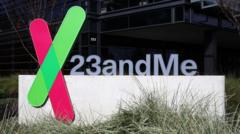23andMe, the pioneering DNA-testing company, is caught in a fight for survival after an alarming share price decline and leadership turmoil. While they insist on commitment to customer data privacy, experts warn of serious implications surrounding genetic information.
Struggles Mount for 23andMe as Survival Concerns Grow Amidst Data Privacy Issues

Struggles Mount for 23andMe as Survival Concerns Grow Amidst Data Privacy Issues
Once a frontrunner in the DNA-testing industry, 23andMe faces a dramatic drop in market value and the precarious future of customer data security.
In the span of just three years, 23andMe, the once-celebrated DNA-testing company, has seen its fortunes shift dramatically. Once boasting a share price higher than that of tech giant Apple, the company is now struggling to stay afloat in a turbulent market, facing severe financial challenges and nagging concerns over customer data security.
Before its downturn, 23andMe captured public attention with a flood of consumers eager to uncover their genetic heritage, ancestry, and familial connections. Celebrities such as Snoop Dogg, Oprah Winfrey, and Warren Buffet drew attention to the company as millions flocked to send in saliva samples for potentially life-altering insights. At its peak, the company's share price soared to an impressive $321. However, that figure has since plummeted to a mere $5, representing only 2% of its former value.
So, what brought on this rapid decline? Experts point to a critical flaw in 23andMe’s business strategy. According to Professor Dimitris Andriosopoulos from Strathclyde University, the company lacked a sustainable model post-initial sale; once customers received their DNA reports, the incentive to return was minimal. Further complicating matters, 23andMe’s plans to monetize an anonymized version of its extensive DNA database for pharmaceutical research have been slow to materialize, given the lengthy drug development timelines. “If I had a crystal ball, I’d say they will maybe last for a bit longer,” Andriosopoulos stated, offering a bleak outlook for the company's future.
The uncertainty at 23andMe is mirrored within its leadership ranks. A mass resignation of the board last summer has left only CEO and co-founder Anne Wojcicki from the original team. Amid rampant speculation about the company’s potential sale or dissolution, Wojcicki has publicly asserted her intention to keep the company private, rejecting third-party acquisition bids.
Adding to the tension, competitors like Ancestry have begun calling on U.S. regulators to scrutinize any prospective sale involving 23andMe, should it reach that point. The company maintains that its commitment to data privacy and protection remains intact, regardless of its ownership situation. A company statement highlighted that applicable laws would govern any future ownership transitions, and customer terms would only change with explicit consent.
However, privacy experts express concern over the sensitive nature of the data 23andMe handles. As Dr. Carissa Veliz points out, the implications extend beyond individual users; sharing DNA data can inadvertently expose the genetic information of family members who never consented to the testing. Although 23andMe reassures customers that their data privacy is protected by existing laws, experts like Professor David Stillwell emphasize the unique risks surrounding DNA data. It is exponentially more complex to rectify genetic data breaches compared to compromising financial information.
Despite the company’s assurances, skepticism remains high, especially given its previous data breach last year. Veliz advocates for a more comprehensive approach to personal data protection, warning that as long as the trade in personal data continues, consumers remain at risk. "The terms and conditions of these companies are typically incredibly inclusive; when you give out your personal data to them, you allow them to do pretty much anything they want with it," she cautioned.
As 23andMe continues to navigate these unpredictable waters, the future of its business model and the safety of intimate genetic information hangs in the balance, illustrating the profound implications of the tech landscape.























